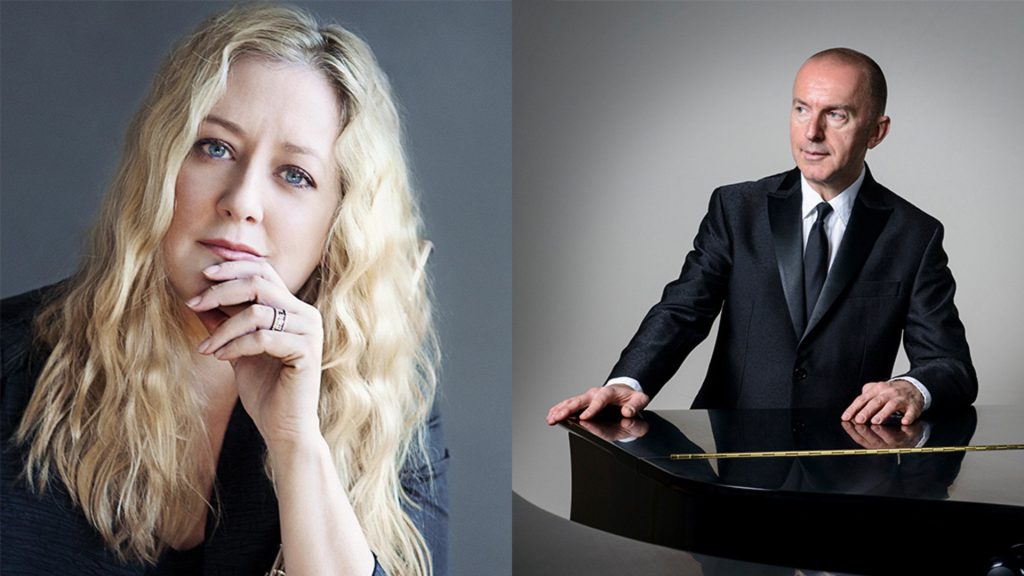Chamber Music Society program undone by a question of balance

Flutist Tara Helen O’Connor and pianist Pedja Muzijevic performed a Chamber Music Society program Thursday night at the Rose Studio.
The duo recital by flutist Tara Helen O’Connor and pianist Pedja Muzijevic, presented Thursday night by the Chamber Music Society of Lincoln Center in that venue’s Rose Studio, had everything going for it.
The delightfully eclectic program bounced around four centuries from baby Mozart to profound Bach to the latest video-electronica. The artists played everything with fire and style and clearly enjoyed each other’s company. Their ensemble seemed flawless, whether in subjective rubato phrases or dazzling passagework.
And yet the whole thing was nearly undone by that old recital bugaboo: balance.
At least half the time, O’Connor’s mellow flute could hardly be heard over Muzijevic’s piano. It wasn’t that the pianist was banging or overpedaling or committing any other excess. The tones of the two instruments were simply mismatched. The sound of the flute tended to dissolve in the sound of a firmly and expressively played Steinway grand, rather than stand apart from it.
The problem reared its head almost immediately, just a page or two into Mozart’s Sonata in F major, K. 13, when the eight-year-old composer (maybe with help from father Leopold) served up some sophisticated counterpoint between the instruments. The piano got the better of that exchange, as it did in the gentle imitations of the Andante (the piano “echoes” were louder than the flute originals).
But both players played with purpose and a sense of direction, which is more than these child Mozart pieces sometimes get in performance. The brief finale on a daringly chromatic theme came off well.
Carl Reinecke’s Sonata in E minor, Op. 167, “Undine,” is a robust Romantic work, a blend of classical four-movement form with a tone poem on the fairy-tale story of a water nymph who seeks a human soul through the love of a nobleman. Naturally cascades of notes in the piano were involved, and on Thursday the flute-protagonist seemed to have difficulty keeping her head above the rushing waters.
Echoes of Mendelssohn and Schumann abounded in this sonata, with its busy piano scales, scintillating scherzo-like Intermezzo, and heart-on-sleeve Andante. In the stormy Allegro molto finale, flutist O’Connor finally caught the piano wave and rode it in bold, fervent phrases.
Lipstick, a 1998 piece for flute/alto flute and soundtrack by Dutch pop artist/composer Jacob Ter Veldhuis, who styles himself JacobTV, was all about the visuals. Having changed her black-and-gold recital gown for black leather drapery, O’Connor performed solo in front of a projection screen that was jumping with multicolored images of lush lips and fragments of television interviews, variety shows, and the like.
The flutist expertly coordinated her rapid, syncopated line with a recorded collage of TV talk-show chatter and percussion instruments. A slower section in the middle matched the deeper, mellower tone of the alto flute with sepia-toned footage of 1940s New York street life and the Third Avenue El, before the piece switched back to jittery imagery of a hoop dancer and fast, agitated scales on the flute.
The setting may have been city streets and TV sets instead of Romantic landscapes and rivers, but one could imagine that JacobTV’s character of the leather-clad flutist was on an “Undine”-like soul quest of her own.
Following the intermission, flutist and pianist continued this refreshingly unconventional program with a Bach sonata bookended by music of present-day American composers.
A different sort of update of Romanticism took place around 1980, as composers such as George Rochberg and Joseph Schwantner took a fresh look at tonal harmony and its possibilities. Thursday’s second half began with a flute-and-piano transcription of Schwantner’s song “Black Anemones,” originally a setting of a surrealistic text by the Colombian-American poet Agueda Pizarro. Pianist Muzijevic played exclamations in recitative style as O’Connor demonstrated impressive breath control in long notes, delicately inflected.
Bach can sound great on a modern piano, and Muzijevic’s rhythmic yet flowing performance in the first movement of the majestic Sonata in B minor, BWV 1030, left nothing to be desired on that score. But paired with the soft-edged flute tone in that small room, the Steinway sounded too beefy, and one found oneself wishing for a harpsichord, the better to hear the fine tapering of the flutist’s phrases.
In the aria-like second movement, marked Largo e dolce, O’Connor played sweetly, as indicated. The problem this time was not a mismatch of instruments; the pianist simply played too loud.
The sonata closed brilliantly with a fugal Presto that segued into a gigue. Both players performed with wonderful articulation and nuance, but once again the flute was overmatched tonally.
Composers Belinda Reynolds and Randall Woolf joined the artists onstage for brief chats and introductions of their pieces. During Reynolds’s Share, with its limpid flute melody floating over gently pulsing piano chords, one felt oneself actually relaxing physically—no more straining to hear the flute! A feeling of tenderness and nostalgia suffused the room as the pianist played a long diminuendo and the flutist mused in her lowest register.
Continuing the something-completely-different spirit of the evening, the program closed with Woolf’s raucous Righteous Babe, with Muzijevic pounding out a syncopated boogie that Jerry Lee Lewis would be proud of, and O’Connor matching him in her most piercing top range.
The Chamber Music Society of Lincoln Center presents an all-Mozart program 5 p.m. Sunday at Alice Tully Hall. chambermusicsociety.org; (212) 875-5788.


